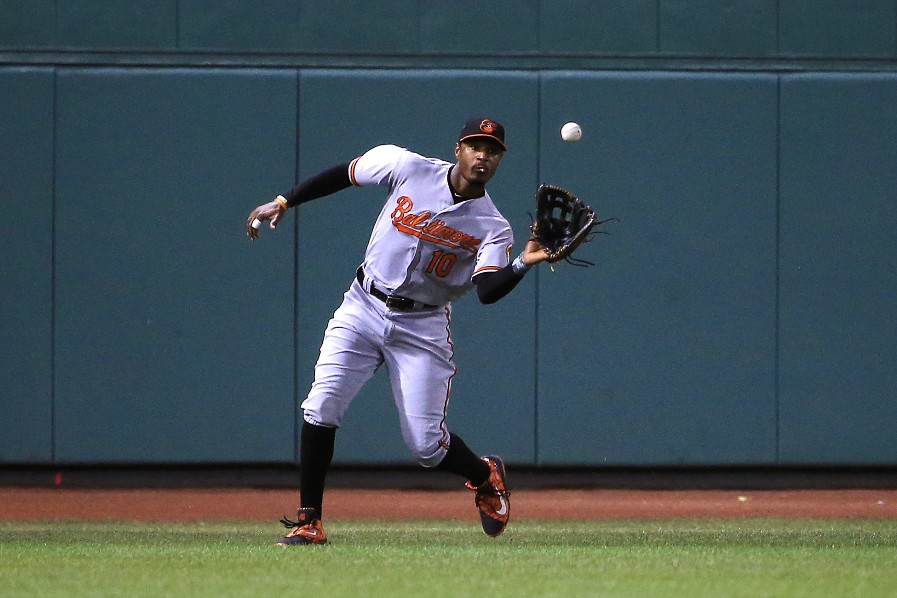On Monday May 1, Baltimore outfielder Adam Jones said he was called the N-word and had a bag of peanuts thrown at him by some Boston Red Sox fans.

Jones said it was one of the worst experiences he’s encountered in the 12-years he’s been a player, according to USA Today (May 1).
“Very unfortunate.” Jones said. “I heard there was 59 or 60 ejections tonight in the ballpark. It is what it is, right. I just go out and play baseball. It’s unfortunate that people need to resort to those type of epithets to degrade another human being. I’m trying to make a living for myself and for my family.
“The best thing about myself is that I continue to move on, and still play the game hard. Let people be who they are. Let them show their true colors.’’
While the number of such incidents may have fallen over the decades since Jackie Robinson, Time magazine writer Sean Gregory reported (May 2), “In his 2002 book Shut Out: A Story of Race and Baseball in Boston, sportswriter Howard Bryant writes that ‘many black ballplayers over the years, starting with Jackie Robinson and funneling down, from David Justice, Albert Belle, and Tim Raines, to Gary Sheffield and Dave Winfield, have all either expressed hesitancy about playing in Boston or inserted language into their contracts that expressly prevented them from ever being traded to the Red Sox.’
“In 2007, Los Angeles Angels outfielder Gary Matthews Jr. said that Boston fans were ‘loud,’ ‘drunk,’ and ‘obnoxious,’ and that Fenway is ‘one of the few places you’ll hear racial comments.’ ”
In a follow-up in response to the Adam Jones incident, The Washington Post (May2) said that “Police on Tuesday put the number of ejections at 34, including the person who threw the peanuts. The Red Sox called the behavior ‘inexcusable’ and apologized to Jones, with Boston Mayor Marty Walsh chiming in to say, ‘We are better than this.’
“ ‘The Red Sox want to publicly apologize to Adam Jones and the entire Orioles organization for what occurred at Fenway Park Monday night,’ team president Sam Kennedy said in a statement. ‘No player should have an object thrown at him on the playing field, not be subjected to any kind of racism at Fenway Park.
“The Red Sox have zero tolerance for such inexcusable behavior and our entire organization and our fans are sickened by the conduct of an ignorant few. Such conduct should be reported immediately to Red Sox security and any spectator behaving in this manner forfeits his/her rights to remain in the ballpark and may be subject to further action. Our review of last night’s events is ongoing.’ ”
In the past, such incidents would have been chalked-up to the cost of black athletes playing the game. I’m glad that the Red Sox president, Boston’s mayor, and MLB President Rob Manfred addressed this issue immediately in language and consequences that make it clear that this is not acceptable.
In Chicago, home of the baseball’s long suffering Chicago Cubs who won their first World Series title in 108 years, a different sort of story gained attention.
CBS 60 Minutes reporter Bill Whitaker takes a look at the real success of the ballclub.
While the team’s president, Theo Epstein and Cubs manager, Joe Maddon choose players based on statistics, their final calculus includes something more.
“So you’re looking for more than just their skills,” Whitaker asks. “You’re looking for character.”
“Yeah,” Epstein says, “because baseball’s a game with a ton of adversity inherent in it. And players that tend to respond to adversity the right way, and triumph in the end are players with strong character. If you have enough guys like that in the clubhouse you have an edge on the other team.”
“You said, ‘I used to scoff at character.’ What changed?
“I just saw over the years that the times that we did remarkable things,” Epstein says, “it was always because players didn’t want to let each other down. Players wanted to lift each other up.”
“So how do you determine which player has the character traits you’re looking for?”
“Find out how he treats people when no one’s looking,” Epstein continued. “You go talk to their girlfriend. You go talk to their ex-girlfriends. You go talk to their friends. You talk to their enemies.”
In the high-pressure world of sports, Manager Joe Maddon says fans expect nothing but the best from players. So, how do they deal with the pressure?
“I talked about pressure and expectations as being positives,” Maddon says. “And they are. Embrace it. Embrace the target. Embrace the pressure. Embrace expectations. Because if you do, you could end up winning the first World Series in 108 years in Chicago.”
“Your team lost the first six games,” Whitaker points out… “And you’re flying off to the seventh. And you go through the plane and you pour a drink for each one of your players. And they have no idea why you’re doing this.
“I had this really good bottle of whiskey,” Maddon explains. “Pour a little shot in each guy. And then I went up to the front, got the P.A. system and I announced, to the best 0-6 team in the history of Major League Baseball.
“So what was the lesson from that?” Whitaker asks.
“It’s about never quitting. It’s just to break the tension. So burden lifted. Pressure eased. And I could play baseball again.”
Currently, the Chicago Cubs are third place in the National League’s Central Division.
And the ethical take-away from these stories: treat people with civility and decency. And when it comes to the pursuit of excellence, remember that diligence, doing one’s best, persevering, maintaining good work habits and continuous improvement are all vital when others rely on our knowledge and skills.
Oh, and something more… something bigger.
Comments










